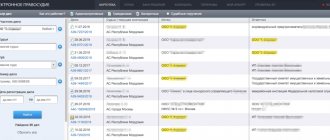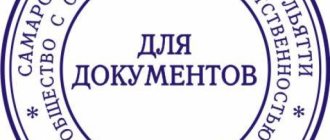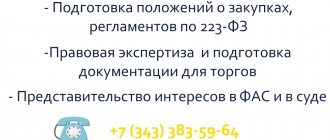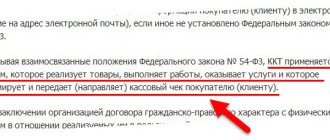Does the LLC providing training pay VAT?
An organization can also apply a VAT exemption in accordance with Art.
145 of the Tax Code of the Russian Federation, if for the three previous consecutive calendar months the amount of revenue from the sale of services excluding tax did not exceed a total of two million rubles. If an organization under the general taxation regime provides educational services, but is not created as a non-profit organization whose main activity is educational, then it does not have benefits for the provision of these services. In accordance with sub. 14 paragraph 2 art. 149 of the Tax Code of the Russian Federation, educational services provided by non-profit organizations are not subject to VAT. Educational services provided by commercial organizations or individual entrepreneurs are subject to VAT in accordance with clause 3 of Art. 164 of the Tax Code of the Russian Federation at a rate of 18%, and there are no benefits or features of tax calculation for them for this type of service. Taxpayers who apply a special taxation regime (STS) may not calculate or pay VAT, because are not VAT payers.
Results
VAT on educational services is calculated and paid in accordance with the generally established procedure, taking into account the norms of the Tax Code of the Russian Federation.
However, if these services are provided by a non-profit organization that has the appropriate licenses for this, and the services are not of a consulting nature, then the taxpayer has the right not to pay VAT on these services. Commercial organizations and individual entrepreneurs have an exemption from taxation on educational services only if they use the simplified tax system or when conducting training outside the Russian Federation. You can find more complete information on the topic in ConsultantPlus. Free trial access to the system for 2 days.
When are educational services subject to VAT?
The field of educational services involves mostly non-profit organizations operating on the basis of licenses confirming their right to carry out educational activities. At the same time, for many types of such services they have benefits and are exempt from the obligation to charge VAT on them.
Thus, in order to take advantage of the right to be exempt from VAT, such an organization must have a license to provide the above services, and in the case of providing services for additional education and professional training, the license must specify the focus of education. At the same time, services provided by educational organizations in the capacity of consulting, as well as services for the rental of premises by them, are subject to VAT in the generally established manner.
Who is eligible for tax relief?
Institutions and organizations providing educational services can take advantage of the right to tax benefits based on the provisions of Art. 149 NK. Current legislation provides for educational institutions a complete exemption from VAT. At the same time, it is important to fulfill the basic condition: only an organization conducting non-profit activities in the field of educational services can receive tax benefits.
This category includes institutions that operate not to make a profit, but to achieve social goals in the field of education.
Should an educational institution pay VAT on paid services?
The sale by non-profit educational organizations of goods (work, services) both of their own production (produced by educational enterprises, including training and production workshops, within the framework of the main and additional educational process) and purchased externally is subject to taxation, regardless of whether the income is directed from this sale to a given educational organization or for the immediate needs of ensuring the development and improvement of the educational process, unless otherwise provided by this Code;
In accordance with paragraph 14, paragraph 2 of Art. 149 of the Tax Code of the Russian Federation is not subject to taxation (exempt from taxation) the sale of services in the field of education provided by non-profit educational organizations for the implementation of general education and (or) professional educational programs (basic and (or) additional), professional training programs specified in the license, or educational process, as well as additional educational services corresponding to the level and focus of educational programs specified in the license, with the exception of consulting services, as well as services for leasing premises.
Educational services: VAT
Thus, “preferential” taxation in accordance with subclause 4.1 of clause 2 of Article 146 of the Tax Code of the Russian Federation is applied in state-owned educational institutions, or if a budgetary or autonomous educational institution provides services within the framework of a state (municipal) assignment, the source of financial support for which is a subsidy from the budget .
However, consulting services, as well as services for leasing premises, are not exempt from paying value added tax. Also, VAT is levied in an educational institution on the sale of goods (work, services) both of its own production (produced by educational enterprises, including training and production workshops, as part of the main and additional educational process) and purchased externally. It does not matter whether the income from this sale is directed to this educational institution or to the immediate needs of the development and improvement of the educational process (subclause 14, clause 2, article 149 of the Tax Code of the Russian Federation).
Tax accounting
If an educational organization, in addition to transactions subject to VAT, carries out transactions that are not subject to taxation (exempt from taxation), it is necessary to organize their separate accounting. This is the requirement of paragraph 4 of Article 149 and paragraph 4 of Article 170 of the Tax Code of the Russian Federation. Separate accounting is maintained:
— at the cost of shipped goods (works, services, property rights), taxable and exempt from taxation;
- according to the amounts of input VAT included in the cost of goods (works, services, property rights) acquired to perform taxable and tax-exempt transactions (separate accounting of input VAT).
Separate accounting of input VAT is necessary due to the fact that input tax on goods (works, services, property rights) used to perform taxable transactions is accepted for deduction (clause 2 of Article 171 of the Tax Code of the Russian Federation). And for transactions exempt from taxation, input VAT must be included in the cost of the purchased goods (work, services, property rights) (subclause 1, clause 2, article 170 of the Tax Code of the Russian Federation).
There is no specific methodology for maintaining separate accounting of transactions subject to VAT and exempt from taxation in the Tax Code of the Russian Federation. Therefore, an educational organization can maintain separate accounting in any order that allows differentiating between taxable and VAT-exempt transactions.
For example, accounting for taxable and tax-exempt transactions can be kept in subaccounts specially opened for sales accounts. You can also use analytical accounting data (tables, certificates, etc.) or information from the journal of issued invoices and the sales book.
The chosen procedure for maintaining separate accounting of taxable and tax-exempt transactions must be fixed in the accounting policy for tax purposes.
It is possible not to keep separate records of input VAT only in one case: if for the quarter the share of expenses for the acquisition, production and (or) sale of goods (work, services, property rights) exempt from VAT does not exceed 5 percent of the total acquisition expenses, production and (or) sale of goods (work, services), property rights. Then the input VAT presented by suppliers in this quarter can be deducted (paragraph 9, paragraph 4, article 170 of the Tax Code of the Russian Federation).
Important to remember
In terms of tax accounting, the institution must develop an accounting policy for tax purposes, establishing in it the procedure for maintaining separate VAT accounting and the registers in which separate accounting data is recorded.
Published in the journal “Accounting in Education” No. 9, September 2013.
Accountant's Directory
In addition to advanced training in the above forms, internships and professional retraining are also considered types of additional professional education according to the same document. At the same time, in accordance with clause 13 of the Regulations on the procedure and conditions for professional retraining of specialists, approved by Order of the Ministry of Education of Russia dated September 6, 2000 N 2571, the development of additional professional educational programs for professional retraining of specialists ends with a mandatory state final certification. And only educational institutions that have the appropriate licenses can implement additional professional educational programs for the purpose of assigning additional qualifications to a specialist.
So, the question of the possibility of applying VAT benefits when conducting paid seminars comes down to establishing whether the seminar can be equated to educational services for conducting the educational and production process in the field of additional education.
Educational services are exempt from VAT
Exemption from taxation (provided for in subclause 14, clause 2, article 149 of the Tax Code of the Russian Federation) is valid only if the institution has a license for these services (clause 6 of article 149 of the Tax Code of the Russian Federation). Let us recall that educational institutions receive licenses in accordance with Article 33.1 of the Law of the Russian Federation of July 10, 1992 No. 3266-1.
According to paragraph 1 of subparagraph 14 of paragraph 2 of Article 149 of the Tax Code of the Russian Federation, VAT is not assessed on services in the field of education provided by “non-profit educational organizations for the implementation of general education and (or) professional educational programs (main and (or) additional), professional training programs specified in the license, or the educational process, as well as additional educational services corresponding to the level and focus of educational programs specified in the license, with the exception of consulting services, as well as services for leasing premises.”
We recommend reading: The entered snils does not exist
VAT educational services
Are educational services subject to VAT? Due to the specific nature of educational activities, VAT is not paid on all transactions. Some educational services are not subject to VAT (not recognized as subject to taxation or exempt from taxation). For other services, VAT in educational institutions must be calculated and paid. This entails the need to maintain separate VAT accounting.
To begin with, let’s consider the norm provided for in subclause 4.1 of clause 2 of Article 146 of the Tax Code of the Russian Federation, which came into force on January 1, 2012. According to this norm, “the performance of work (provision of services) by state institutions, as well as budgetary and autonomous institutions within the framework of a state (municipal) assignment, the source of financial support of which is a subsidy from the corresponding budget of the budgetary system of the Russian Federation, is not recognized as subject to VAT.
Insurance premiums for employee training expenses
The documents regulating the payment of insurance premiums for employee training expenses are: the first part of Article 7 of the Federal Law “On insurance contributions to the Pension Fund of the Russian Federation, the Social Insurance Fund of the Russian Federation, the Federal Compulsory Medical Insurance Fund” No. 212-FZ dated July 24, 2009, second paragraph first paragraph of Art. 5, paragraph 1, art. 20.1 Federal Law “On compulsory social insurance against accidents at work and occupational diseases” No. 125-FZ of July 24, 1998
According to the provisions of these documents, payments and other remuneration accrued by the organization in favor of individuals within the framework of employment contracts and contracts of a civil law nature, the subject of which are the performance of work, provision of services, are subject to insurance contributions for compulsory health insurance, for compulsory social insurance in case of temporary disability and in connection with with maternity, compulsory medical insurance, as well as insurance premiums for compulsory health insurance against industrial accidents and occupational diseases.
The amounts specified in Art. 9 of Law No. 212-FZ and Art. 20.2 of Law No. 125-FZ.
These include:
- amounts paid by the organization for training employees under the basic (additional) professional education program. Regulatory document – clause 12, part 1, art. 9 of Law No. 212-FZ;
- amounts paid by the organization for training employees in basic professional educational programs, additional professional programs and basic professional training programs for personnel. Regulatory document – paragraphs. 13 clause 1 art. 20.2 of Law No. 125-FZ.
According to the above documents, all types of compensation payments related to reimbursement of expenses for professional training, retraining and advanced training of employees are exempt from insurance payments.
The Federal Insurance Service of the Russian Federation, in letter No. 14-03-11/0813985 dated November 17, 2011, established that payment for employee training, initiated by an employer who wants to improve the employee’s performance, is not subject to insurance payments. In this case, the form of training does not matter. The regulatory documents are the ninth article of Law No. 12-FZ and Article 20.2 of Law No. 125-FZ.
The Ministry of Health and Social Development of the Russian Federation adheres to the same opinion, which is reflected in clause 2.1 of letter No. 2519-19 dated 08/05/2010, clause 5 of letter No. 2538-19 dated 08/06/2010.
The FSS of the Russian Federation in letter No. 14-03-11/08-13985 dated November 17, 2011 explained that the amount of the cost of studying at universities for individuals not working in the organization (for example, family members of an employee, former employees, etc.) is also not subject to insurance premiums. This is legal, since, according to the first part 7 of Article 212 of the Federal Law and Article 20.1 of the Federal Law No. 125, the objects of taxation with insurance payments include payments and remunerations accrued to individuals under an employment contract and a civil process agreement for the provision of services and performance of work.
In what cases are educational services not subject to VAT?
Also, VAT taxation of educational services does not apply to persons carrying out the type of activity in question outside the country. This opinion of the Ministry of Finance was expressed by officials in a letter dated December 5, 2011 No. 03-07-08/342.
As already mentioned, non-profit organizations predominate in the field of educational services. In view of this, the Tax Code of the Russian Federation establishes for them the opportunity to obtain VAT exemption from taxation of their activities (Article 149 of the Tax Code).
VAT on the provision of educational services: who pays, when is it paid?
- If the owner of a retail outlet is a commercial organization, then the sale of goods is subject to VAT in the general manner. For example, Lilia LLC, which operates in the catering industry, opened a buffet in PTU-14. VAT should be charged on the cost of goods sold by the buffet.
- If goods are sold directly by an educational organization, then their cost is exempt from VAT if two conditions are met simultaneously:
- educational institutions sell food products;
- The organization independently produced the products it sold.
- general educational services. This category includes services provided by schools and preschool institutions within the framework of approved government programs. If a specialized educational institution (gymnasium, sports school, etc.) implements additional educational programs developed independently, then such activities are also exempt from VAT;
- services of universities, technical schools, vocational schools, etc. Vocational training services provided by higher education institutions, as well as institutions of secondary specialized education, are not subject to VAT. Similar to the situation with preschool and secondary education, services of both basic and additional (special) programs are provided with benefits;
- educational activities in specialized clubs and sections. If a sports (art, music) school operates on a paid basis, but does not distribute profits among participants, but uses it to meet the needs of the organization, the services provided by this institution are not subject to VAT;
- vocational training services for various fields of activity. If, on a non-commercial basis, an institution provides services for conducting seminars, trainings, and advanced training courses in various areas, then such activities are exempt from VAT.
Accounting entries for accounting
Let us examine the accounting procedure for the sale of food products in the cafeteria of an educational institution.
Example No. 2. On 07/23/16, the buffet of the Economic Lyceum No. 1 received a batch of 120 “Start” chocolate bars. The cost of the batch is 2,760 rubles, VAT 421 rubles. The receipt of goods is reflected in the accounting of Economic Lyceum No. 1 with the following entries:
| Debit | Credit | Description | Sum |
| 41 | 60 | A batch of “Start” bars has arrived at the warehouse of Economic Lyceum No. 1 (RUB 2,760 – RUB 421) | RUB 2,339 |
| 19 | 60 | The amount of VAT on the cost of the bars has been allocated | 421 rub. |
| 60 | 51 | The cost of purchased Start bars was paid to the supplier | RUB 2,760 |
| 68 VAT | 19 | VAT is accepted for deduction | 421 rub. |
In April 2021, a batch of bars was sold in the buffet of the Economic Lyceum No. 1 at a price of 38 rubles. a piece. Upon the fact of sale, the accountant of Economic Lyceum No. 1 made the following notes:
| Debit | Credit | Description | Sum |
| 50 | 90 Buffet revenue | Revenue from sales of Start bars is reflected (RUB 38 * 120 pcs.) | RUB 4,560 |
| 90 VAT | 68 VAT | VAT on sales allocated | 696 rub. |
| 90 Cost of goods sold in the buffet | 41 | The cost of bars sold is reflected | RUB 2,339 |
Nuances of VAT accounting: services not subject to VAT
You cannot receive benefits for consulting services and services for which there is no license, or income from renting premises. So, you can use the benefit only when the educational organization is engaged in its direct activities for which it has a license.
If a medical organization or doctor conducts a private practice, they must certainly have a license corresponding to their activity. If it is not there, there will be no benefits. The documents are in order - the benefit is required to be used. It is impossible not to use it. But intermediary services in the medical sector are taxed. This rule is enshrined in Article 149, paragraph 7.
Payment for training without VAT or with VAT
On January 1, 2021, Federal Law No. 303-FZ of August 3, 2020 comes into force, increasing the VAT rate from 18 to 20%. Starting from November 30, 2016, Federal Law No. 401 allowed payment of fees and tax payments to third parties. If a company or individual entrepreneur uses just such a payment scheme, then in the current quarter the accountant only has to pay 2/3 of the VAT for the third quarter. If they pay me with VAT, and I do not pay VAT, then I have to pay 18% to the state? This follows from articles 408, 815, 823 and 862 of the Civil Code of the Russian Federation.
You can pay for tuition using a receipt through various banks, but as a rule, when paying without opening an account, the bank charges a high commission. In accordance with paragraph 4 of Art. 174 of the Tax Code of the Russian Federation, when purchasing goods, services (work), VAT is subject to transfer to the budget simultaneously with the payment (transfer) of funds to the foreign counterparty. On January 31, 2013, we will create a document “Outgoing payment order” with the type of operation “Tax transfer”. The signed deed was returned without a date of signing. One of the most well-known taxes is VAT or value added tax. In this case, payment for services rendered and advances are taken into account in different sub-accounts: Account 62.01 - payment received in the general manner; Account 62.02 - advances from buyers. In accordance with Article 149 of the Tax Code, services for the transportation of passengers by public urban passenger transport (except for taxis, including minibuses) are not subject to VAT. ii. At the same time, VAT amounts on assets purchased using these subsidies are not subject to deduction.
Are services for writing an educational program subject to VAT?
The Federal Tax Service, having considered an online appeal about the application of VAT in the provision of educational services, on issues falling within the competence of the Federal Tax Service of Russia, reports the following. According to subparagraph 14 of paragraph 2 of Article 149 of the Tax Code of the Russian Federation (hereinafter referred to as the Code), operations for the sale on the territory of the Russian Federation of services in the field of education provided by non-profit educational organizations for the implementation of general education and (or) professional educational programs (main and ( or) additional), professional training programs specified in the license, or educational process, as well as additional educational services corresponding to the level and focus of educational programs specified in the license, with the exception of consulting services, as well as services for leasing premises.
We recommend reading: How to get a divorce with division of property
And reasoning on this topic leads to the idea that the purpose of any seminars (conferences, symposiums) is to study problematic issues, that is, the participants of the seminar (representatives of educational institutions, employees of various organizations, etc.) receive new knowledge and information caused by the need for their use in practical activities (production process, enterprise management process, etc.). And even if the seminar participants are given some kind of document stating that they listened to lectures on certain topics, most likely, tax authorities will still look for evidence that the seminar participants actually received a consulting service. One can, of course, argue: since an educational institution has a license for educational activities, then the seminar is educational, not consulting.
Documenting
The employee must submit his request for payment for studies in a free form.
An agreement with an educational institution (organization carrying out educational activities) may be concluded by:
- the employee himself;
- the organization in which the student works.
In the first case, the organization compensates the employee for the cost of training. In the second case, the organization itself will conclude an agreement for the provision of educational services to the employee and pay their cost. In such a situation, the manager issues an order to pay for the employee’s education at the expense of the organization’s own funds.
All facts of the economic life of the organization must be confirmed by primary documents that contain the details listed in Part 2 of Article 9 of the Law of December 6, 2011 No. 402-FZ. Such documents, for example, could be:
- agreement with an educational institution;
- act on the provision of educational services.
Educational services as a VAT object
- Russian commercial institutions providing training outside the Russian Federation (subclause 3, clause 1.1, article 148 of the Tax Code of the Russian Federation);
- commercial educational institutions using the simplified taxation system (STS);
- organizations providing services for the implementation of preschool education, as well as services for conducting classes with minor children in music schools, sports sections, all kinds of development centers, regardless of the form of ownership and departmental affiliation (subclause 4, clause 2, article 149 of the Tax Code of the Russian Federation).
- general educational services specified in the license, provided by non-profit institutions within the framework of basic state-approved programs, as well as independently developed special programs;
- vocational education services specified in the license, provided by higher and secondary educational institutions, within the framework of basic and specially developed programs;
- services for conducting classes with minor children in music schools, sports clubs, development centers, services for raising and maintaining children in preschool institutions;
- optional educational services (seminars, trainings) corresponding to the content of the educational programs specified in the license.
Services with or without VAT
But at the same time, working without tax may be unprofitable, because when entering into an agreement with an organization that does not pay VAT, the buyer will not be able to receive a deduction, so many contractors choose companies that pay tax in the general manner. An extensive list of goods, works, services and operations, exempt from VAT, is given in Article 149 of the Tax Code of the Russian Federation. Here are the operations exempt from tax (a number of operations from the list require a license; if an organization does not have one, it cannot apply tax exemption): Only companies operating in their own, and not in the interests of others, under agency agreements, commission or commission agreements. Another important condition is to separate and separately account for taxable and non-taxable transactions. An important difference between firms exempt from tax under Article 145 of the Tax Code of the Russian Federation from special regimes is the need to issue invoices from the o. They need to draw up invoices when selling services, goods and performing work, as well as when receiving advance payment from buyers, and register the invoice in the sales book. In addition, such invoices can be prepared by organizations and individual entrepreneurs in special regimes or carrying out operations and selling goods exempt from taxation under Art. They have no obligation to issue invoices, but they have the right to do so, for example, at the request of the buyer.
The seller, at his own discretion, agrees or refuses such a request, but he will not receive any obligations and will not lose anything. Previously, invoices indicated “VAT exempt,” but now fields 7 and 8 are marked “Without VAT.” They do not need to register an invoice in the sales book, but if they want to register a document, the right is retained. The counterparty who received the invoice invoice without VAT, does not enter the document into the purchase book, since there is no tax in it. If there is no tax, there is nothing to deduct, and it will not be possible to use it even if you have completed documents. When drawing up an agreement, indicate the subject of the agreement, the transaction price, the payment procedure and VAT. Indicating the contract price without VAT may lead to an increase in the price by the amount of tax. If you are not required to pay tax, indicate “without VAT” or “VAT not subject to” and the basis for tax exemption.
Features of VAT accounting in budgetary organizations
OBJECTS OF VAT TAXATION, EXEMPTION FROM PAYMENT
Tax is charged in cases where a budgetary institution carries out transactions that are subject to VAT. The list of such operations is given in Art. 146 of the Tax Code of the Russian Federation (hereinafter referred to as the Tax Code of the Russian Federation). These include, in particular:
- sale of goods (works, services, property rights) on the territory of the Russian Federation;
- transfer of goods on the territory of the Russian Federation (performance of work, provision of services) for one’s own needs, the costs of which are accepted for deduction (including through depreciation deductions) when calculating corporate income tax;
- carrying out construction and installation work for own consumption;
- import of goods into the territory of the Russian Federation and other territories under its jurisdiction.
NOTE
Operations that are not subject to VAT are listed in paragraph 2 of Art. 146 of the Tax Code of the Russian Federation.
In accordance with sub. 4.1 clause 2 art. 146 of the Tax Code of the Russian Federation does not recognize the performance of work (provision of services) by budgetary and autonomous institutions within the framework of a state (municipal) assignment, the source of financial support for which is a subsidy from the corresponding budget of the budgetary system of the Russian Federation. In other cases, the performance of work (provision of services) by such institutions is subject to VAT in accordance with the general procedure.
Budgetary organizations can receive exemption from taxpayer obligations as part of fulfilling the requirements of Art. 145 of the Tax Code of the Russian Federation in the following cases:
1) are not engaged in income-generating activities (entrepreneurial activities);
2) for the three previous consecutive calendar months, the amount of revenue from the sale of goods (works, services) of these organizations, excluding VAT, did not exceed a total of 2 million rubles .
Organizations using the right to exemption must submit the appropriate written notification and documents specified in paragraph 6 of Art. 145 of the Tax Code of the Russian Federation, to the tax authority at the place of its registration.
Important detail: notification and documents must be submitted no later than the 20th day of the month from which organizations exercise the right to exemption.
- Documents confirming the right to release ( extension of the release period ):
- extract from the balance sheet (represented by organizations);
- extract from the sales book;
- an extract from the book of income and expenses and business transactions (represented by individual entrepreneurs).
Exemption from the obligation to pay VAT does not relieve the taxpayer of the duty of a tax agent . If a budget organization is a lessee of federal property, property of constituent entities of the Russian Federation or municipal property, it retains the responsibilities of a tax agent for the calculation, withholding and transfer of VAT to the budget.
IT IS IMPORTANT
Tenants (tax agents) are required to calculate, withhold from income paid to the lessor, and transfer to the budget the appropriate amount of VAT, which is calculated as the product of the rent and the estimated tax rate (clause 4 of Article 164 of the Tax Code of the Russian Federation).
EXAMPLE 1
A healthcare institution rents premises for a bacteriological laboratory and is a tax agent for VAT. Monthly payments under the lease agreement due to subsidies amount to 59,000 rubles .
The amount of VAT in this case can be determined using the calculation method:
59,000 rub. × 18% / 118% = 9000 rub .
The following entries will reflect this in accounting:
Debit account 4.109.70.224 Credit account 4.302.24.730 - 50,000 rub. — the institution’s expenses for rent are reflected;
Debit account 4.109.70.224 Credit account 4.303.04.730 - 9000 rub. — reflects the amount of VAT withheld by the institution as a tax agent.
Thus, under the lease agreement, the institution withheld from the income paid to the lessor the amount of VAT that it is obliged to transfer to the budget. The rental amount excluding VAT is transferred to the lessor (according to the terms of the agreement).
The institution must issue an invoice, which should be reflected in the sales ledger.
How to pay for educational services with or without VAT
Accrual of VAT on the cost of services of non-state educational institutions Factor Academy is a non-profit organization that, as part of its activities, implements basic and additional educational programs. "Factor" does not have a state license and provides educational services as a private educational institution. Is VAT subject to charge? Despite the fact that Factor is a non-state educational institution, the academy has the right to use the VAT tax benefit. The main criterion in this case is the following: “Factor” is a non-profit organization that implements educational programs.
Thus, in order to apply “preferential” taxation in accordance with subclause 4.1 of clause 2 of Article 146 of the Tax Code of the Russian Federation, the institution must be state-owned or the following conditions must be met at the same time:
Study leave
When sending an employee for training, the employer must provide him with study leave (hereinafter referred to as ES). It can be either paid or unpaid.
In this case, the following conditions must be met:
- The employee is sent for training by the enterprise that is his main place of work. The regulatory document is Article 287 of the Labor Code of the Russian Federation.
- The employee presented a certificate of summons from the educational institution in the approved form. The regulatory document is Article 177 of the Labor Code of the Russian Federation. The employer provides the employee with the number of vacation days that is contained in the certificate. The number of vacation days can be reduced by the employer at the request of the employee. In a situation where the total number of days of educational leave, confirmed by certificates of summons, for the current academic year exceeds the duration established by the Labor Code of the Russian Federation, the company is obliged to send the employee to a paid educational institution for the number of days that fits into the standard, and an unpaid educational institution for the remaining number of days exceeding the standard.
- The employee receives (intends to receive) education at this level for the first time. The regulatory document is Article 77 of the Labor Code of the Russian Federation.
Topic: Individual entrepreneur provides services to LLC without VAT
Good afternoon. It's probably been asked more than once, but I couldn't find it with a search. The question is this: I am an individual entrepreneur under the USN6% system, providing services for creating and promoting websites. The other day we concluded an agreement on the provision of services for an LLC. Later they called me and refused to pay because... I am not a VAT payer, saying that if I don't pay VAT, then they will have to pay it for me.
PS. Judging by the name VAT - value added tax - you would think that it only applies to sales, why do LLCs always stop when they hear that I am not a VAT payer? It just happened more than once.








